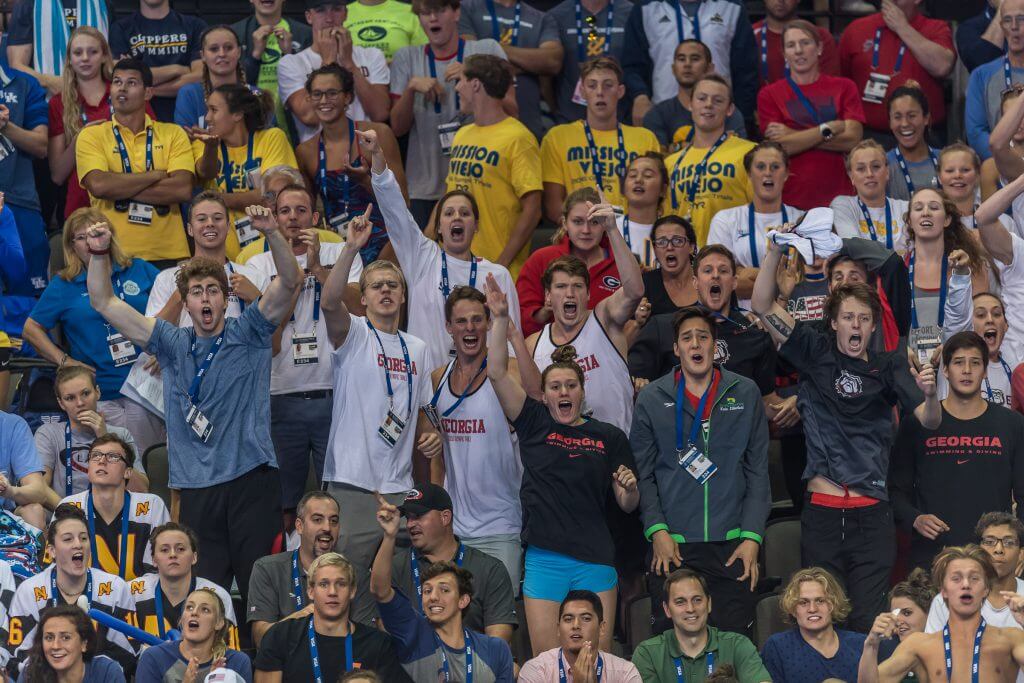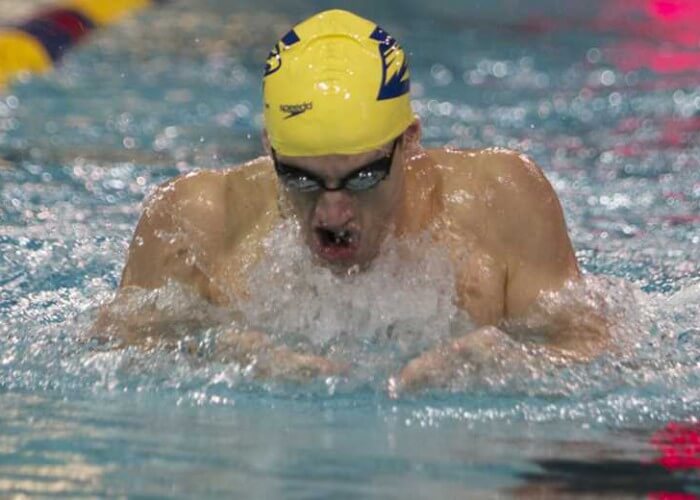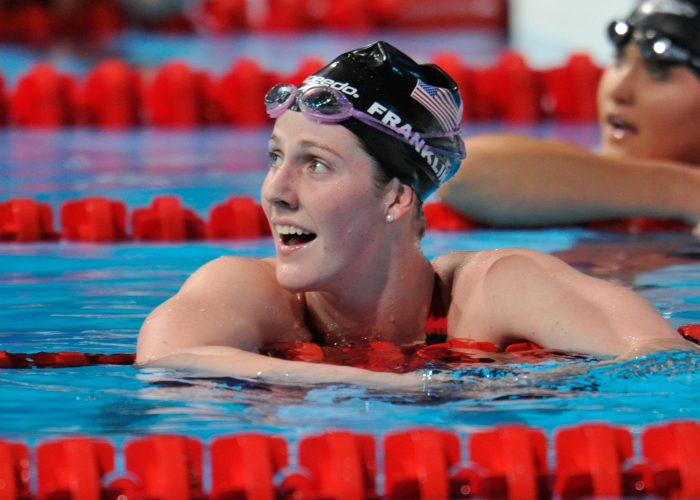How Important is Recognition, Really? A DIII Swimmer’s Olympic Musings

By Julia Cunningham, Swimming World College Intern
The first thing many people ask me once they learn I am a swimmer, if they are unfamiliar with the sport, is if I am going to Olympics. My answer is always a scoff and a resounding “no.” My highest achievement in the sport has been becoming an All-American at DIII Nationals, with a time that wouldn’t even be close to qualifying for the DI equivalent.
At the same time, however, while I am nowhere near the qualifying times, I have certainly put in the working time to feel as though I shouldn’t have to dismiss the Olympics question quite so easily.
I have been swimming for just as many years as Missy Franklin, but that’s about all we have in common. I didn’t go on to make it to Junior Nationals or Nationals. I certainly didn’t qualify for Trials, let alone set a world record before I entered college.
In fact, before entering college, it didn’t take me long to decide I didn’t want to attend a DI school. My times going into college wouldn’t have been the slowest at select schools, but I didn’t want the large student body, the sprawling campus, or the demands of the sport at that level.
And, looking back, I haven’t had any regrets about choosing a DIII program.
Swimming in college at any level is a treat unto itself. It provides a network that you can rely on through college and beyond. Being on a team teaches you countless life lessons, and gains you some of the best friends you’ve ever known. But what if…?
You Have to See It To Believe It

Photo Courtesy: Emory Athletics
What if I had gone DI? What if I had been faster in high school? What if I had had a chance to train under different coaches? What could have been?
These are the “what ifs” that have prompted brief conversations with some of my friends. And the reason why they’re brief is because ultimately, the “what ifs” are irrelevant. And we always come to the same conclusion: we couldn’t be happier with where we ended up.
At NCAAs in Shenandoah, Texas in 2015, I watched Andrew Wilson destroy the DIII NCAA records in the 100 and 200 breaststrokes as well as the 200 IM, in the process posting what would have been the third fastest time at DI NCAAs in the 100 breaststroke.
A year and a half later, I watched him on national television finish fifth in the 100 breast (59.97) at Trials, just .79 seconds behind the winner, Kevin Cordes, a dominant DI swimmer. A few days later, Wilson swam to a fourth place finish in the 200 (2:09.35), 2.18 seconds behind winner Josh Prenot.
When they announced Wilson’s name behind the blocks, they mentioned that it was unusual that a DIII swimmer would be standing there among the DI Champions and American record holders. When I heard that, I laughed aloud. It seemed the understatement of the century.
Andrew Wilson was living every young swimmer’s dream that, for many, will die before they enter college, especially if they go DIII. Wilson, and the many collegiate athletes who made the Olympic team this year, were changing the game. They were bringing recognition to the fact that you don’t have to be a pro athlete to make the Olympics. In fact, their careers started in swim lessons and summer leagues without any inkling of the impact they would go on to make in the sport.
All the Hard Work Pays Off

Photo Courtesy: Joao Marc Bosch
This year’s Trials showcased the types of swims that would refute my usual adamant response to the “Are you going to the Olympics?” question. Trials also provided (additional) answers to my “What ifs?”
Almost every rookie Olympian, after making the team, was asked: “How do you feel right now?” And many of the responses began with “I’m just glad all the hard work paid off.”
That was when I texted my friend: “Yeah, but what about our hard work? Haven’t we put in almost as many hours and almost definitely as many tears?”
The response: “Sometimes I’ll go back and forth about whether or not I’ve put in enough work, but in the end it’s always a ‘yes.’”
Because we’re not Katie Ledekys and Dana Vollmers. We just can’t all be that good. My friend and I both have seen our own hard work play out into many successes, even if they weren’t broadcast to the world. We’ve had our moments, and there’s no reason to regret not accomplishing unfeasible feats.
What we can be is appreciative. Wilson may have not created a stir because he didn’t finish in the top two, but he did draw attention to the fact that a DIII swimmer could final at Trials. Plenty of other DIII swimmers as well as teenagers not yet in high school swam in Omaha, but weren’t seen on national television because they didn’t final. That doesn’t take anything away from the fact that they competed among the greats.
The lack of recognition doesn’t define a career.
So, for the people who don’t know the sport of swimming, it is important that they recognize the careers of the greats as a testament to the hard work we’re all putting in. And for those of us putting in the work, it is imperative to remember that it doesn’t matter if you’re the only one who knows it: the hard work is paying off.




You said you didn’t want the demands of a D1 athlete and then also said you’ve put in as much work as an Olympian? Bit of a contradiction.
D1 athletics demands a lot out of you in the sense of putting athletics first. A lot of D1 athletes have some sort of athletic scholarship to help them go to school. If you don’t perform athletically, there goes your scholarship, making it a lot harder for those students to graduate college because of the cost. D3 on the other hand, has no athletic scholarships and is all academic, thus putting academics first, and athletics second. I know from my own experiences that D3 athletes can still have similar high demands for performance in a competitive swim program as D1 athletes, but the priorities are different. Not only do you have to train and compete at a high level, but you definitely have to perform in the classroom – not just to keep your scholarship, but those were the demands expected of you from your coaches as well. I was a part of a competitive D3 swim program and we were taught the importance of academics, and character outside of the pool. It wasn’t all about the times you swam, it was about your grades, building your knowledge, and developing into a well-rounded individual. This shift in priority eases the pressure athletes can feel when demanded to perform well. I can’t speak for others, but I feel that D3 athletics has some great values instilled amongst the great competitiveness of sport.
Coming from a former D1 swimmer… Academics came first at our school. You cannot simply generalize the division, especially when you are speaking from your own experience that doesn’t include swimming for a D1 program. I have known hundreds of swimmers who swim for a D3 school and honestly admit that their training is mediocre in comparison to high school club swimming. Not only did I bust my can twice a day in the pool and once a day in the weightroom every single day until my 3 weeks off in August, but I had to maintain above a 3.0. If an athlete’s GPA dropped below 3, we would have to spend 10 hrs a week in a supervised room while completing schoolwork (no phones, headphones, social media, etc.)
There is a very big reason D3 NCAA records are practically the qualifying times for D1 NCAA’s. The field is much less competitive.
For the record, I began swimming at 15, and I never imagined myself swimming in college. After qualifying for Olympic trials after 2 years of training, I knew the only way to continue excelling in my swimming career was committing to a highly competitive D1 swim program.
he didn’t want the D1 demands… talking about the moment he decided D3…. not contradiction… D1 have a lot more resourses, better coaches, etc….D3 is diferent but in personal work , time and dedication is the same……